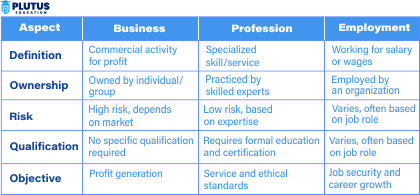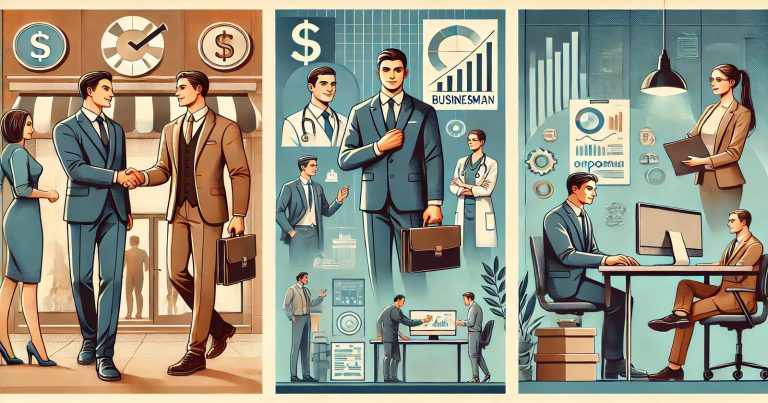The difference between the business profession and employment is how people acquire their livelihood. Business is defined as selling commodities or services to make a profit. A profession is the unique knowledge and skill required to render services. Employment is working under an employer for a salary. Understanding the difference between the business profession and employment helps a person select a suitable career according to his skills, risk-taking ability, and financial goals. This article elaborates on business, profession, and employment and compares them thoroughly.
Introduction to Business, Profession & Employment
Three significant sources of money-making are business, profession, and employment. All these have different characteristics, income structures, and levels of independence. Business people sell goods or services and earn profits. Professionals provide services based on expertise and charge fees. Employees work under employers and receive a fixed salary for their work.
Earning profits involves a risk of activity that a business person must take. Professionals are dependent on skill and reputation. Employees work for stability and security. The differences lie in three factors: risk-taking, investment, qualifications, and earning methods, which differ between business, profession, and employment. A clear understanding of these differences helps individuals make the right career choices.
What is Business?
Business refers to activities where the services are sold to earn profit. Business owners, also known as entrepreneurs, invest money, manage operations, and take financial risks to grow their ventures.
Key Features of Business
Business involves producing, distributing, and selling goods or services to earn a profit. It requires investment, risk-taking, and continuous operations to meet customer demands.
Profit Motive
Businesses have been there for profit maximisation. The main goal is to earn more revenue than expenses. It depends on whether it can sell a product or service at a price higher than the cost of it. A businessman takes risks because the profits are not sure. One needs to manage resources effectively so that the maximum amount of profit is earned.
Investment Requirement
Capital is the first requirement in starting a business. A businessman needs money to buy raw materials, build infrastructure, and hire workers. Investment may be from personal savings, bank loans, or investors. Unlike employment, where there is no risk of losing money, business people have to take the risk of losses.
Risk Factor
Business involves a lot of risks. Government policies, competition, market demand, and economic conditions may impede its profitability. A business person can gain huge profits one year but loses another year. Moreover, the income is not as regular as that of employment. All business incomes fluctuate.
Liberation over the Decision
Business persons have total control over operations. They will determine what to sell, where to invest, and how to control employees. This sort of freedom allows them to expand and grow. Unlike employees who follow employer instructions, business persons make independent decisions.
Customer and Market Dependency
Customer demand and market trends determine business success. If customers do not buy products or services, businesses lose money. Entrepreneurs must learn the market needs, advertise efficiently, and sell competitively.
Types of Businesses
Businesses can be classified into sole proprietorship, partnership, corporation, and cooperative based on ownership structure. Based on their operations, they can also be categorized as manufacturing, service, trading, or hybrid businesses.
| Type of Business | Description | Example |
| Sole Proprietorship | Single-owner business | Grocery shop |
| Partnership | Two or more people own the business | Law firm |
| Corporation | A large company with shareholders | Tata, Apple |
| Franchise | Business under a well-known brand | McDonald’s, KFC |
What is a Profession?
A profession is a job that requires specialised education, training, and certification. Professionals offer specialised services and maintain professional ethics.
Features of a Profession
A profession is a specialized knowledge that requires formal education and training in a specific field. It follows ethical standards, offers services for a fee, and is regulated by a governing body.
Specialised Knowledge and Training
A profession takes years of study and training. For instance, a doctor will study medicine, while a lawyer will graduate from law school. Professionals must sit for exams and acquire licenses to practice. In contrast, business people depend on their knowledge rather than investments.
Service-Based Work
A professional sells his services rather than selling products. A lawyer advises on the law, a doctor heals patients, and an engineer designs buildings. Professionals charge for services; their fees depend on the skills and prestige of a professional.
Professional Ethics
Every profession has a code of conduct. Doctors, lawyers, and accountants must observe ethical rules that maintain trust in them. Violation of the professional standards would lead to revocation of licenses. In contrast, business profits are the motives for decision-making. Professions are based on quality service.
Limited Risk
Professions are less risky financially than businesses. Professionals do not require significant investments or be worried about market fluctuations. However, they risk losing clients if they do not provide good service. Unlike employees, professionals do not receive a fixed salary.
Independent or Employed Work
Professionals can work individually or as staff in organisations. A lawyer may start a private practice or work in an organisation of lawyers. A doctor may start his clinic or work in a hospital. This freedom helps professionals decide on how they will operate.
Examples of Professions
- A doctor running a private clinic.
- A chartered accountant handling company finances.
- A lawyer representing clients in court.
- A teacher conducting coaching classes.
What is Employment?
Employment refers to working for an employer on a salary. Employees are engaged in assigned duties under a contract and receive regular monthly remittances.
Major features of employment.
Employment is the act of performing work or services for wages or salary. It avails financial surety, job security, and career progression.
Fixed Salary or Wages
Employees receive a guaranteed salary, regardless of company profits. Unlike business owners, who face financial risks, employees have stable income sources.
No Financial Investment
Employees don’t invest money to get their wages. They work for an organisation, follow instructions, and execute their assigned work. Employees do not make a loss like business people.
Job Security Stability
An employment arrangement gives security via contracts and labour legislation. Employees enjoy health insurance, paid leave, and pension. In contrast to business people, who face uncertain profitability, employees face stable income.
Limited scope for growth
Employees work under managers and have very little power to decide anything. Promotions depend on experience and performance. Employees cannot expand or innovate like business owners.
Examples of Employment
- A teacher in a school.
- A software engineer in an IT company.
- A bank employee handling customer accounts.
- A salesperson in a retail store.

Difference Between Business Profession and Employment
Business, profession, and employment are three primary economic activities that differ in purpose, risk, and income sources. While business focuses on profit through goods and services, a profession requires specialised skills to offer expert services, and employment involves working for a salary under an employer.
| Aspect | Business | Profession | Employment |
| Nature | It involves selling goods or services to earn profits. The primary aim is to make money by creating or distributing products. | It involves offering specialised services based on knowledge, education, and skill. A profession has ethical standards and codes. | It consists of working for an employer or organisation in exchange for a fixed wage. The employee serves at the employer’s discretion. |
| Risk Factor | High risk, as profits are not guaranteed. Business success depends on market demand, competition, and management decisions. Losses can occur if the business fails. | Low risk, as professionals earn based on their reputation and expertise. However, they risk losing clients if service quality is poor. | Low financial risk, as employees receive a fixed salary regardless of the company’s profit or loss. Job security depends on performance and company stability. |
| Sources of Income | Profit from business activities. The more sales, the higher the earnings. Earnings depend on sales and expenses. | Fees charged to clients for professional services. Earnings increase with expertise, reputation, and number of clients. | Basic monthly salary or wages paid by the employer. Employees may also receive bonuses and allowances. |
| Investment Needed | High capital investment is required to start and run a business. Expenses include inventory, marketing, rent, and salaries. | Low investment, mainly for education, licensing, and certification. A professional may invest in setting up a private practice or office. | No financial investment is needed. The employer provides the workplace, equipment, and training. |
| Qualification Required | No specific qualification required, but knowledge and experience help in business success. Some businesses require technical skills. | Requires specialised education, professional degrees, and certifications (e.g., doctors, lawyers, engineers). | Depends on the nature of the job. Some require high qualifications, while others may not need formal education. |
| Decision-Making | Complete control over decision-making. Business owners decide on pricing, investments, expansion, and hiring. | Partial independence. Professionals make decisions regarding their services but must follow industry standards and regulations. | No decision-making authority. Employees follow employer policies, company rules, and assigned tasks. |
| Work Nature | Highly flexible. Business owners decide their working hours, strategies, and operations. | There is some flexibility, but professionals must adhere to schedules and client needs. Some work independently, while others have fixed-job roles. | Employees follow employer instructions and have limited flexibility. |
| Growth Potential | Unlimited. Businesses can expand, open new branches, and increase sales for higher profits. Growth depends on strategy and market conditions. | Growth depends on reputation, experience, and client base. Highly skilled professionals can increase their income and reach higher positions. | Limited growth. Employees get promotions based on experience and performance but do not have ownership or profit-sharing opportunities. |
| Legal Requirements | Businesses must be registered, pay taxes, and follow government regulations. Licenses may be required for certain companies. | Must obtain a professional license or certification to practice legally. Professionals must follow industry-specific ethical and legal rules. | Employment contracts, labour laws, and company policies govern employee rights and responsibilities. |
| Control & Autonomy | Complete control over operations, profits, and decision-making. Business owners can expand or alter their strategies at will. | Limited control. Professionals work independently but must comply with industry regulations. Those employed in firms have less autonomy. | No control. Employees work under employer supervision and follow company policies. |
| Objective | Increase profits, grow the business, and expand in the market. Success is measured based on sales and customer satisfaction. | Provide professional services while maintaining ethical standards. Reputation and client satisfaction are key success factors. | Job security, career growth, and a steady income. Employees focus on job performance and skill-building. |
| Taxation | Business owners must pay taxes, GST, and income tax based on earnings. | Professionals must pay income tax and professional tax on earnings. | Employees pay income tax, which employers deduct from their salary. |
| Termination & Exit | Business owners can close, sell, or expand their businesses anytime. They suffer financial losses if the company shuts down. | Professionals can retire, change professions, or start their businesses. Reputation remains essential. | Employees can resign, be terminated, or retire based on company policies. Job loss may occur due to downsizing. |
| Examples | A shopkeeper running a retail store, a factory owner manufacturing goods, an online entrepreneur selling products. | A doctor running a private clinic, a lawyer practising in court, a chartered accountant managing financial reports. | A teacher working in a school, a bank employee handling customer accounts, and an engineer working for an IT company. |
Business Functions at the Enterprise Level
Companies run through various functions, such as marketing, finance, production, and human resources. The importance of such functions lies in the fact that they support the company in growth and profit.
Major Business Functions
- Marketing: It sells products to customers.
- Finance: It deals with money, investment, and expenditure.
- Production: Produces goods or services
- Human Resources: Human resources recruits and employee
- Customer Service: Satisfaction of the customer.
These functions help businesses succeed in competitive markets. Without proper management, companies may fail.
Business Vs Profession Vs Employment FAQs
- What are the differences that will define the business profession from employment?
Business profit, professionals charge a fee, and employment gives a fixed salary.
- Can a professional turn to be a business person?
Yes, Doctors and lawyers can even be entrepreneurs.
- Which one is better, business, profession, or employment?
Depending on the preference of the individual. The business will give freedom, professional skills will be required, and employment will provide stability.
- What are some common examples of business, profession, and employment?
Business includes the retail shops. A profession includes doctors. Employment includes teachers.
- What do business, profession and employment contribute to the economy?
They give rise to employment, generate income, and advance economic activities.


